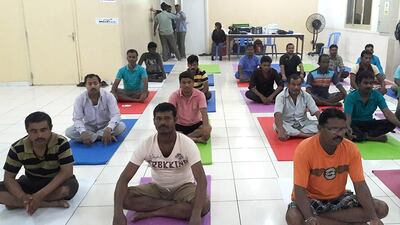DUBAI // A new project supports workers by offering to pay their children’s education fees.
Other projects offer classes in English, yoga and meditation to labourers.
Organisers said Sapna, a Hindi word for “dream”, would help ease their concerns about the welfare of their families in their homeland.
The most important criterion for the selection of workers is regular attendance.
Saleem B, who works in an aviation engineering company’s maintenance department, said it was a relief that his daughter’s school fees would be paid.
“I will not have to worry about her school fees, tuition and even transport because these bills will be paid,” he said.
“She says she wants to be a doctor because she sees long lines of people waiting at the doctor’s clinic and wants to take care of all these people. Getting her through school is a start,” said Saleem, whose daughter attends school in India’s Tamil Nadu state.
As part of the Sapna scheme, volunteer mentors in Dubai keep in contact with the children, track their academic progress and speak to their teachers and principals.
As he no longer needs to pay for his child’s education, Saleem is saving money to buy a family home in India.
He hopes the project will give his daughter the opportunities he did not have.
“I always worry that if someone speaks to me in English, what do I say? I can read but can’t speak English well,” said Saleem, who speaks several Indian languages.
“When we are home our own language is enough, but when you work in other countries you need to know English.
“I’m happy that my daughter will study hard because to move ahead you also must know English.”
The programme – launched by SmartLife, an NGO for workers’ welfare – has identified 13 pupils in Indian schools, and plans to pay for the education of 20 more children this year.
For workers who earn less than Dh2,500 per month, the scheme fully covers their children’s school fees.
Although all the applicants have been Indian workers, the programme is also open to workers of all nationalities.
“Sapna is like a big tree,” said Bijumol C, who works in a Dubai school, while her husband is a plumber in Kerala. The scheme will cover her younger son’s Grade 11 school fees.
“I work so that my children can study. This will be a big help for my family.”
Manjula Ramakrishnan, a spokeswoman for SmartLife, said Sapna was not just about giving money.
“The focus is mentoring,” she said.
“Many parents are school dropouts, so they do not know what is required in a school.
“We have found that younger children find maths and English difficult.
“We speak to teachers so that they can get additional help in these subjects.”
The group also runs talent contests, organises free medical check-ups, skills workshops, meditation and yoga programmes to promote a healthy lifestyle for workers of both genders. Others have similar plans to help workers.
“With basic training they can communicate to their superiors, with local authorities. It is a challenge for them to read signboards or detailed instructions,” said Amanjeet Singh, a financial consultant who works with the Indian consulate to help workers.
He plans to launch skills programmes to build workers’ confidence.
Workers’ monthly wages range between Dh600 and Dh1,800, of which they send a large percentage home.
“Many work for the same salary until they return home, where they find there is nothing for them to do and hardly any savings,” said Nita Mathur, a management consultant with Ambeone Training and Development Institute.
It has plans to offer training to semi-skilled staff such as plumbers, electricians and air-conditioning maintenance workers.
“If they upgrade their skills, they could do better,” she said.
“With training in balancing accounts and scheduling appointments they could handle a business when they return home.”
rtalwar@thenational.ae


